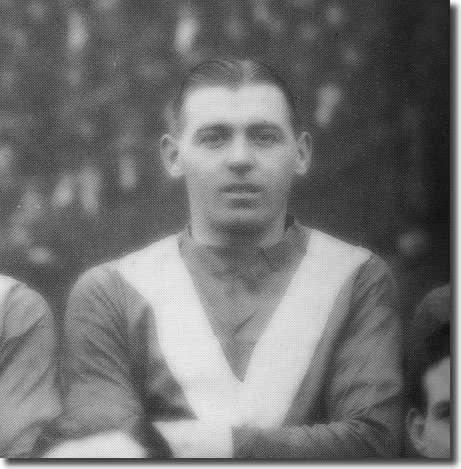 Part
1 1915/16 - Part 2 1916/17 - Part
3 1917/18 - Results and tables
Part
1 1915/16 - Part 2 1916/17 - Part
3 1917/18 - Results and tables
For 1918/19, Leeds City welcomed back most of the players who
had served them the previous season. One unfortunate exception
was Bob Hewison, still recovering from breaking his leg in May.
A newcomer to their ranks was the Aberdeen half-back, Bert
McLachlan, who had also served Everton and Aston Villa. The
Scot was at right-half on the opening day, 7 September at home
to Notts County, in a team which read: Willis Walker; Harry Millership,
Billy Hampson; McLachlan,
Harry Sherwin, Tommy Lamph; E
Hampson, Billy Hibbert, Jack Peart, Jack Hampson, Tom
Cawley.
City won with ease. After ten minutes, Hibbert and E Hampson
combined to create an opening for Peart, who drove home. Cawley
doubled the lead from a corner and then added a third in the second
half, with Hibbert making it 4-0. Short pulled a goal back for
County in the closing stages.
After the match, the City directors presented a silver tea service
to goalkeeper Willis Walker, whose marriage had taken place a
few days earlier. He missed the Meadow Lane return against County
on 14 September, having to return to Naval duties in the South,
and locally-born Walter Cook
deputised. Inside-left Arthur Price also returned to the side
in place of McLachlan, with Jack Hampson dropping back to midfield.
City, dominant at Elland Road, had a rude awakening in the return,
Short scoring within four minutes for County. Richards and then
Cantrell made it 3-0 just before the half hour, the latter adding
a fourth three minutes after the interval. City exerted some second
half pressure and Lamph scored from a penalty, but then County
added a fifth, also from the spot. Notts missed another spot kick
before Price made it 5-2 in the closing minutes.
City were back on form against Birmingham at Elland Road on 21 September,
winning 3-1. The Leeds Mercury reported: 'They demonstrated a superiority
in attack which Birmingham could never quite counter, and the success
of their methods was primarily due to the admirable leadership of international
Hibbert, who, taking Peart's customary position in the centre, exercised
his skill to the marked advantage of his co-operators in attack. He was
materially assisted by a trio of halves, who used excellent judgement
in placing their forwards in possession.
'The progressive methods of the City attack were, indeed, both clever
and productive, and Hibbert played a most prominent part. He scored a
fine goal before the interval, and his shoot hard and often policy almost
brought him goals on three other occasions, Cooper having the utmost difficulty
in warding off his shots.
'With a lead of one goal, Leeds City played like a team confident of
victory in the second half. Cawley scored a goal following a combined
movement and after Buchan had scored a somewhat lucky goal for Birmingham
from a pass by Smith. Leeds City made a vigorous attack in the last minute,
and forced a corner, from which E Hampson registered the third goal.'
Again, though, City suffered on their travels, going down 4-2
at Birmingham. They fought back from 2-0 down with goals from
Hibbert and Peart, but were overwhelmed in the second half.
Bob Hewison returned to the side on 5 October against Rotherham
County at Elland Road. He tragically broke his leg again just
before the interval. City were 2-0 ahead at the time with goals
from Price and Hibbert (penalty), but with a man advantage, Rotherham
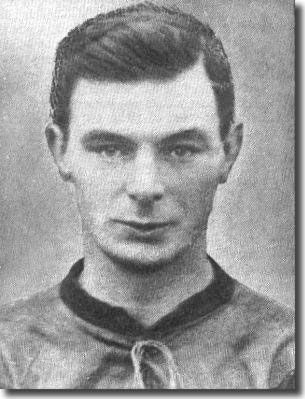 pressed
strongly after the break. They pulled one back, but City held
out for the points.
pressed
strongly after the break. They pulled one back, but City held
out for the points.
The Evening Post's Old Ebor wrote: 'I am afraid R Hewison's football
career is finished for the present season. His present view, I am told,
is that it is concluded for good, but later impressions may not be so
pessimistic, certainly his many friends will hope so. The leg is fractured
practically in the same place as before.'
Charlie Copeland and Billy McLeod were back for an ill-tempered return
game on 12 October. The Leeds Mercury: 'First class football is
happily seldom brought into such disrepute as it was on the occasion of
the visit of Leeds City to Rotherham County's ground on Saturday, when
three players were sent off the field. There had been twenty-five minutes
of good football, when L Smelt, the Rotherham right full-back, was ordered
off the field for some illegality in tackling Price, the Leeds inside-left.
Hardly had the game been resumed than Price and Lloyd, the Rotherham inside-right,
were at loggerheads and, although once parted, they renewed hostilities
on the way to the dressing room. For a time there was a perfect pandemonium
on the ground, and the police were called in. These incidents altered
the whole course of the game.
back to top
'Left with only one full-back, Rotherham frequently had the Leeds City
forwards offside, and the game resolved itself into a succession of free
kicks. The City, who were without Lamph, and played J
Smelt, a Rotherham half-back, in his place, opened the game with a
sensational run by McLeod and Cawley, which enabled Sherwin, by means
of a low swift shot, to score in the first few minutes. A quarter of an
hour later McLeod put on the second but it was not until the last few
minutes of the match that Peart was able to add to the score. Lee was
injured and retired in the second half, Rotherham finishing with only
eight players.'
City were also a man short for the game at Lincoln City on 19
October, when neither Copeland nor McLeod were able to get away
from work in time. Lincoln reserve Arthur
Bavin helped them out at right-half.
Leeds struggled to make any impression on the Lincoln defence
and lost out to a second half goal when goalkeeper Cook misjudged
a lob from distance by Ormiston.
The run of home success continued the following week against
Lincoln. City welcomed back Willis Walker and Clem Stephenson,
both men on a fortnight's leave from the Navy.
It was a one sided affair, as reported by the Yorkshire Post:
'The Lincoln City team were let down very lightly at Leeds on Saturday.
The score against them was 2-0, but it might very easily have been 6-0.
Five shots struck crossbar or post, and open goals were missed in the
most extraordinary fashion. It may be gathered that the Leeds City forwards
were unlucky; it would be more correct to say that they shot badly. Clem
Stephenson must be included in this criticism, despite the fact that he
scored the two Leeds goals, and showed much of his natural deftness and
skill in controlling the ball. Leeds City appeared capable of doing everything
except shooting accurately into open goals. The team, as a whole, are
below last season's standard. They especially miss the services of Hewison
in the back division, and Stephenson's play in the front line would be
productive of good results if that player were more frequently available.
Lincoln City were too easily outmanoeuvred in the first half, but played
better afterwards; indeed, Leeds City's opening score was so long delayed
that the attacks of the opposing side 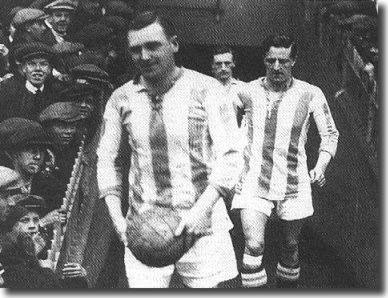 in
the second half caused some uneasiness among the Elland Road supporters.'
in
the second half caused some uneasiness among the Elland Road supporters.'
The Mercury claimed 'Leeds City's success over Lincoln City was
mainly due to the admirable work of Stephenson … His fine turn of speed,
tricky footwork and shooting, and well-timed assistance to his colleagues
were the features of the struggle.'
Stephenson and Walker played in both of the easy victories which
followed against Grimsby Town. The points took City second, just
two behind leaders Nottingham Forest. Two days after the 9 November
3-1 defeat of Grimsby, the conflict in Europe came to an end.
In late September, the British offensive on the Cambrai Front
had led to the storming of the Hindenburg Line, and on 4 October
Germany and Austria sent peace proposals to President Wilson of
the United States. Peace negotiations began on 8 November and
the Armistice was signed at 5am on 11 November, taking effect
at 11 o'clock that morning.
While the news brought great relief throughout Europe, the attention
of the football authorities soon turned to the restoration of
pre-war order.
At a meeting of the Football League on 29 November, the clubs
considered a number of matters, including payments to players.
Resolutions that allowances for expenses should be increased to
3s 6d on two training nights and 15s on match days were unanimously
endorsed. Hull City asked that the Football Association should
be approached with a view to reviving the English Cup competition,
but the motion was rejected.
Leeds City chairman Joseph Connor proposed that the 2 ½ per cent
of League gates paid to the Football Association should be diverted
to the various County Associations for the encouragement of junior
football. Hull City seconded this, but it was pointed out that
the Lancashire clubs had already made provision for their various
associations, and the proposition was defeated.
During the preceding fortnight, Leeds City had lost 3-1 at Bradford
City and beaten the Bantams 2-1 at Elland Road. On 30 November,
they maintained their push for the title with a 2-0 win against
The Wednesday in Sheffield, courtesy of second half goals from
Tom Hall and Jack Peart.
They ought to have won the Elland Road return the following week,
but in the end were relieved to escape with a draw. The mood was
fraught and in the first two or three minutes referee E A Wilkinson
had to separate two men. Minutes later, Harry Sherwin came to
blows with Glennon and the official ordered both players from
the field. Their team mates had some difficulty in keeping the
men from continuing their tussle as they left the pitch.
Old Ebor wrote in the Evening Post, 'It puzzled a good many onlookers
at the Leeds City v Sheffield Wednesday 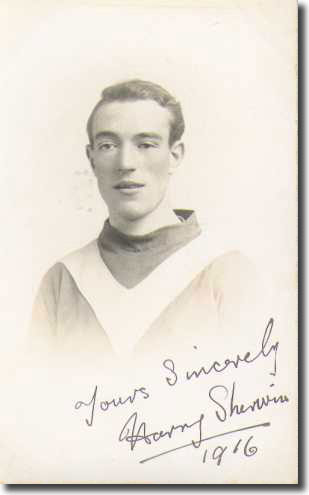 match
to see the outbreaks of feeling between players before the game had been
more than a couple of minutes in progress. I was told that the previous
Saturday's match at Sheffield had been quite friendly, yet here we had
fists up directly, and after some ten minutes' play, Glennon and Sherwin
had vigorous fisticuff exchanges which resulted in both being sent off
the field. As an eyewitness of the incident, I must state that Sherwin
was not the aggressor, but there was no doubt as to the effectiveness
of his retaliation, and the referee was justified in ordering his dismissal,
even though he had first to ask the linesman for his version of the affair.
Possibly the feeling that Sherwin had been hardly dealt with accounted
for the feeling also shown by the crowd. There was, however, some difficulty
in understanding certain of the referee's rulings in the match; and if
it is retorted that this showed the ignorance of the crowd, then I must
admit that I shared their ignorance.'
match
to see the outbreaks of feeling between players before the game had been
more than a couple of minutes in progress. I was told that the previous
Saturday's match at Sheffield had been quite friendly, yet here we had
fists up directly, and after some ten minutes' play, Glennon and Sherwin
had vigorous fisticuff exchanges which resulted in both being sent off
the field. As an eyewitness of the incident, I must state that Sherwin
was not the aggressor, but there was no doubt as to the effectiveness
of his retaliation, and the referee was justified in ordering his dismissal,
even though he had first to ask the linesman for his version of the affair.
Possibly the feeling that Sherwin had been hardly dealt with accounted
for the feeling also shown by the crowd. There was, however, some difficulty
in understanding certain of the referee's rulings in the match; and if
it is retorted that this showed the ignorance of the crowd, then I must
admit that I shared their ignorance.'
back to top
City wasted a number of opportunities, failing to score until
the second half when Hall fired an unstoppable shot high into
the net. Wednesday rallied and in the 65th minute Brittleton equalised.
The same player fluffed a penalty kick as his side pressed for
a winner, but were unable to get the goal their efforts merited.
City were held to another draw, goalless this time, at home to
Hull on 14 December. Two days later the club was left reeling
by manager Herbert Chapman's announcement that he was leaving
to take up a full time role with Joseph Watson & Sons at the Olympia
oil and cake works in Selby. A week later, Chapman's assistant
George Cripps also quit, leaving the club in some disarray.
It was understandable that they should lose the return at Hull
2-1; they then had to be content with a 1-1 draw at home to Huddersfield
on Christmas Day, courtesy of an Arthur Price penalty. Another
spot kick from the same player was enough to secure the points
against the Terriers at Leeds Road the following day.
A single Coventry goal consigned City to their first home defeat on 28
December. The Yorkshire Post claimed that 'it was not a surprising
result, seeing how indifferently the Leeds forwards have been playing
for several weeks past and it should be noted that the inability of the
forwards to press home attacks and to take chances brought about this
reverse. On the balance of play in this match, Leeds City ought to have
won comfortably. There were about 6,000 spectators at the match, and their
disappointment at the poor display was obvious.'
The same teams were due to face each other again on 4 January.
A crowd of between four and five thousand assembled at the ground,
but the referee decided that play was impossible.
City exhibited a notable improvement when they returned to action at
home to Barnsley on 11 January, winning 4-0. Both Willis Walker and Clem
Stephenson were back after being demobbed and, according to the Mercury,
'there was obviously something of the old snap and vigour in the City
attack. Clever as ever in conceiving and effecting these breaks through,
the City forwards for once in a way infused some pep into their finishing.
'It might be too much to say that Clem Stephenson's return was entirely
responsible for this revival, but the quick perception of the ex-RND forward
was a decisive factor in the general success of the line. His clever understanding
with Hall, and the efficient co-operation of Peart and Price, cut out
some perfect situations, and if the centre's peculiar ineptitude to find
the target - his best efforts found Mitchell's highest form, but he missed
two or three apparent gifts - robbed the side of the full fruits of its
superiority, they enjoyed such a monopoly that they were in the position
of masters throughout the piece.
'Singularly enough, City obtained least reward when they appeared in
their most destructive light, their solitary point of the second half
being entirely due to Mitchell's extraordinary anticipation in the Barnsley
goal. Price dashed through with certain winners, Stephenson, Peart and
Hall bombarded the goal with a puzzling variety of shots but the Sheffield
keeper, whether in dealing with these or rushing out to fill the gap created
by the defeat of his guards, was pre-eminent. Mitchell certainly saved
a 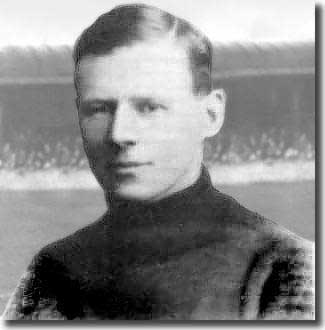 Barnsley
rout.'
Barnsley
rout.'
On the following Tuesday, there was an important Football League
conference held in Manchester. Among the key business was the
thorny issue of pay and two players from each League club were
invited to attend in a bid to head off agitators.
The Yorkshire Post: 'A lot of mischievous and ill-informed talk
has been heard at meetings held in support of the formation of a Football
Players' Union on trade union lines. A friendly discussion between players
and managing officials should counteract this; certainly it ought to show
professional players that the interests of the clubs and themselves are
identical, and that only harm to both, and to the sport as a whole, can
be the result of listening to agitators to whom the propagation of unrest
and strikes always seems an agreeable business.'
The Players Union had been closed down with the cessation of
professional football during the war and most of the union officials
were still on duty in Europe. A group of London-based professionals,
angry at the lack of consideration shown them, pushed for a more
militant approach.
The Times reported on Monday, 30 December: 'A meeting of the newly-formed
Professional Football Players' and Trainers' Union, which has now been
formally registered as a trade union, was held at the Memorial Hall, Farringdon
Street, on Saturday. Mr Frank Bradshaw (The Arsenal), who presided, announced
that the deputation which had waited upon the Committee of the London
Combination had been received with great courtesy and that their representations
would be put before the proper authorities. He believed that the present
allowance to players would be doubled.
'Mr Sam Bradley (London District secretary of the ASE) said that they
must demand that the Football Association and the League should meet the
Union's representatives to agree upon conditions satisfactory to the Union
before normal football was resumed. The Union must insist that contracts
should be for 12 months only, that there should be no transfer fees as
between club and club, that every player should become a free agent at
the termination of his agreement, and that £6 a week should be the lowest
wage for a professional.
'Nearly all those present were enrolled as members of the Union, and
it was announced that meetings would be held shortly in Manchester, Birmingham
and Glasgow. Scotland was stated to be solid for the Union, and promises
of support had been received from the players of Nottingham Forest, Notts
County, Lincoln City, Everton, Hull City and Leeds City.
'In a manifesto issued to players throughout the country it was demanded
that normal football conditions should be resumed as from May 1 next,
on which date new engagements should begin.'
ThePFA.com: 'With a threat that the FA would move against this
new organisation because of its perceived militancy, Charlie Roberts,
who had arrived at the meeting late from Manchester, took action. He reassured
the FA that the old union would be able to continue on pre-war terms and,
with the agreement of the London men, re-established the Players Union
back in Manchester.'
back to top
The Yorkshire Post: 'Mr Charles Roberts, on behalf of the players,
said he thought they would agree that during the war the professional
football player had done his duty manfully. Now there were players who
had families, but who were receiving only 15s a week and training expenses
which the clubs were allowed to give them, work at munitions having come
to an end. He thought clubs might take a little more risk and pay their
players more even if the overdraft were increased.
'Sir Henry Norris MP (Fulham) said the London Combination clubs 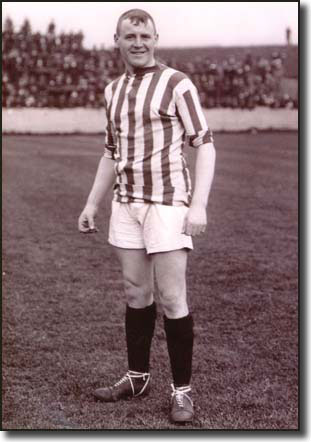 were
probably able to pay more than the League clubs, and perhaps arrangements
might be made under which they could do so. Mr John Lewis, who spoke of
the impossibility of some clubs paying more than at present, stated that
players who had been working on munitions had been making £8 or £9 a week.
The Management Committee knew this to be the case from the insurance documents,
which had been furnished to them when players were injured.
were
probably able to pay more than the League clubs, and perhaps arrangements
might be made under which they could do so. Mr John Lewis, who spoke of
the impossibility of some clubs paying more than at present, stated that
players who had been working on munitions had been making £8 or £9 a week.
The Management Committee knew this to be the case from the insurance documents,
which had been furnished to them when players were injured.
'Mr Jesse Pennington (the international full-back) asked if there was
a fusion of the Players' Union in London and the old Players' Union, would
the League Management Committee receive anyone that they might wish to
appoint to discuss with them.
'The chairman: So long as they are attached to a trade union we will
not meet them. There can be no union between men who live by manual labour
and those who play football. There was no objection to meeting the old
Players' Union. I have no hesitation in saying, so far as I am concerned,
I would have a proper Players' Union tomorrow, but I will never agree
to meeting a trade team, because there is nothing between a player who
plays an hour and a half a week, and a man who works 46 or 47 hours, so
far as a trade union is concerned. The strength of a trade union is the
strike clause, and imagine a crowd of 30,000 people on the field and a
strike being declared. (Applause)
'After further discussion, the players retired and on returning to the
meeting later, Mr Charles Roberts said the players were of opinion that
a little extra in the shape of expenses should be allowed, and they had
passed the following resolution: That the expenses be increased to £2
per week, and that clubs should be free to go above that what they possibly
could.
'The chairman said it was impossible to concede this figure at the present
time. If the gate receipts continued to increase, he had no doubt an effort
would be made to get the sanction of the FA to an increase on the present
allowances.
'Sergeant Instructor Hardinge (Arsenal) said he found there was more
unrest among players in the North than in London. He had seen no trade
unionism in the London body, but the new union had agreed to join the
old Players' Union.
'The chairman: If no other good can come out of the meeting, then you
have done good, and taken the right action, and one that will please every
man in the room.
'Mr Roberts remarked it was the intention of players to do all they could
to reconstruct the game after the war. But the clubs must do something
for the players and do it quickly. The players then retired.'
Resolutions were passed and taken to a meeting of the FA Council
at their offices in Russell Square, London, on Monday 27 January.
FA chairman J C Clegg presided over a packed session.
It was resolved that 'clubs may during this season join any combination
of clubs which may be convenient to them. For the remainder of the season
leagues and clubs may make such temporary arrangements for the payment
of players as they may desire, and, further, it was decided that the registration
of players shall commence on May 1, 1919. It was also decided that arrangements
between clubs and their players should be limited to one season, including
the close season.'
Various discussions continued and the Football League held a
special general meeting of its clubs at the Grand Hotel in Manchester
on 10 March. It was agreed that the two divisions of the League
would be expanded to 22 clubs in each case and players' wages
would increase by 50% on pre-war rates, rather than the 75% demanded
by players.
On the field, Leeds City followed their 4-0 defeat of Barnsley
by beating the Tykes with a Tom Hall goal at Oakwell on 18 January;
they saw off Leicester Fosse 4-2 at Elland Road the following
week, when Gainsborough winger Herbert Lounds made his City debut.
According to Yorkist in the Leeds Mercury, 'Leeds City gave a
convincing display in opposition to Leicester and gained no more than
their desserts. Not that they were brilliant - the conditions were too
obstructive - but the combination of skill and vigour with which they
tackled the proposition always promised a successful solution.
'Nothing could have been finer than their recovery after Fosse, in one
fleeting, lucky raid in the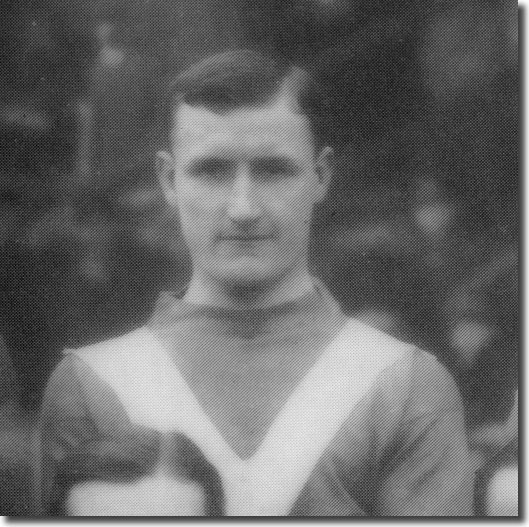 second half, counter-balanced in the space of three minutes the products
of the City's earnest endeavours of the previous fifty minutes. It was
then the City attack proved they were no mere showmen. They revealed a
reserve of stamina and dash which carried the opposition and the crowd.
It is true it was a penalty which gave them a level start in the last
lap, but it was the manner in which they pursued and obtained the deciding
points which made them worthy victors.
second half, counter-balanced in the space of three minutes the products
of the City's earnest endeavours of the previous fifty minutes. It was
then the City attack proved they were no mere showmen. They revealed a
reserve of stamina and dash which carried the opposition and the crowd.
It is true it was a penalty which gave them a level start in the last
lap, but it was the manner in which they pursued and obtained the deciding
points which made them worthy victors.
back to top
'Still, there would have been no call for this illuminating rally had
the City captured the substance in their first half chase and not the
shadow. It was a curiosity of the game that Leeds should reap least when
they were in their most destructive mood. They swept the Fosse defence
off its feet, but the combination of mud, bad luck and Bown, with the
latter the ruling element, limited their goals to one, instead of at least
four… There was one shot he did not stop, and many he could not have done
had the luck been on the marksman's side - notably one terrific bar-shaking
drive of Hall's - but his daring and anticipation robbed City of about
an equal number of apparent certainties. He started the second half in
similar style, but eventually found that, though he could tackle the City
forwards, one, two and sometimes three at a time, he could not counter
all of them all the time.
'City were an all-round superior combination. The domination of the forwards
was primarily due to the active co-operation of the vanguard. McLachlan
and W Hampson not only kept the
Fosse notabilities, Donaldson and Gibson, under subjection, but continually
placed Lounds and Price in an effective striking position, the full-back
playing a well-nigh perfect game. The former Fosse star, Kirrage, had
no chance to shine as a leader with J Hampson always on his track, and
Lamph completed the success of the line by providing Stephenson and Hall
with sufficient support to make the City right wing an attractively live
force. The judgement and understanding between this couple was superb
at times, and they wasted few shooting opportunities.'
City were below par the following week when they fought out a
drab goalless draw at Leicester; the game was poor preparation
for their clash with table toppers Nottingham Forest at the City
Ground on 8 February. The Peacocks were five points behind Forest
with seven games remaining and a victory was essential if they
were to close the gap.
They welcomed Manchester City left winger Joe
Cartwright in place of Lounds and had high hopes he might
be a match winner for them against Forest, who boasted the best
defensive record in the section, with much credit going to Aston
Villa and England keeper Sam Hardy.
The Leeds Mercury: 'Leeds City played some strong, virile football
and infused so much dash and energy into their work, that their superiority
was undoubted, and their success well deserved… The City, right from the
kick off, adopted the right tactics. Their forwards swung the ball about
from wing to wing in admirable style, and the Forest defence had to give
in sooner or later. It came soon. Midway through the first half a miskick
by Bulling saw the ball drop at Stephenson's feet. He pounced on it and
hooked it past Hardy before the home defence could retrieve the blunder.
Six minutes later came the second goal, scored by Peart, who completed
a delightful passing movement with Stephenson by driving the ball into
the far corner of the net.
'The game was won for Leeds City in the first half, and although they
continued to have all the best of matters right up to the close the Forest
defence held out.
'It was forward where Leeds City shone most. The vanguard soon found
a weak spot in the Forest defence, and they played on it for all they
were worth, and in Cartwright they had an admirable player. He and Price
worked together with grand cohesion, and with Peart and Stephenson ever
ready to shoot, the line was formidable.'
City thus looked forward with anticipation to the 15 February
return but were hammered 4-0 before a crowd of 11,000, Elland
Road's best of the season.
The Yorkshire Post: 'The Leeds City team experienced a complete
turn of the tables in the return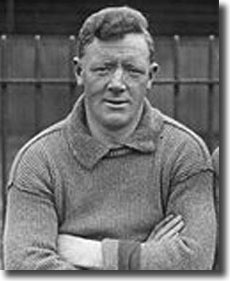 match with Nottingham Forest at Elland Road, a brilliant victory on the
Forest ground being followed by a severe defeat on their own enclosure.
match with Nottingham Forest at Elland Road, a brilliant victory on the
Forest ground being followed by a severe defeat on their own enclosure.
'The side was faced with a dispiriting circumstance to begin with. J
Hampson, the centre-half, missed a train connection and had not arrived
when the kick off was due. Copeland, the full-back, was present as a spectator,
and at the last moment he had to be pressed into service. The match proceeded
five minutes while he was getting ready for play. Certainly, it was discouraging
thus to be called upon, and to play in a strange position and it was not
surprising that at centre-half, right-half and outside-right in turn,
Copeland should have been unable to do the service he would have liked.
Hampson turned up about a quarter of an hour after the match had started.
'The state of the ground was conducive to slips and fluky play, but after
some preliminary flounderings the players settled down to a fast game.
It was not until after about ten minutes' play that an indication of the
probable result was forthcoming. J Hampson's absence was then seen likely
to have a disturbing effect on the City's tactics, for Copeland seemed
to have little idea of breaking up the close combination of the Forest
inside-forwards; indeed, he was practically a spectator when the visitors'
centre swung the ball out to Martin, giving the latter practically a clear
course for a sprint. Martin finished with a cross kick, and sending to
Birch, he drove it into the net well out of Walker's reach.
'The City had a good share in the raiding for the next half hour, but
the usual combination of intermediate and front line was lacking, and
Hardy was very seldom pressed. The speed and cleverness of the Notts inside-forwards
and their immunity from serious breaking up tactics produced another score
to Notts just before the interval, but there was a distinct doubt as to
the legitimacy; at any rate, some of the Leeds men were standing and appealing
for offside, while Burton practically beat Walker at his leisure. The
Forest, therefore, changed ends with the score 2-0 in their favour.
back to top
'The play in the second half was frequently difficult to follow owing
to the misty atmosphere, but sufficient could be seen to enable the onlookers
to realise that the City half-back trio was unable to hold the Forest
forwards in check and that far too much defensive work had to fall upon
Millership, W Hampson and Walker. When Burton scored a second time, the
City goalkeeper had three forwards to face unaided. Halford put on the
fourth goal, and again Walker was unassisted, for after he had broken
back an attack by them, the Forest centre-forward had him helpless. The
City certainly tested Hardy a few times near the finish, but they were
a disorganised and beaten side almost from the start of the match.'
Defeat left City with just five games left in which to eradicate
their five-point deficit on Forest; it was not an impossible challenge
but highly unlikely. Hopes were raised by a 3-1 victory at Bradford
Park Avenue, but were all but eradicated when Park Avenue won
5-2 at Elland Road on 8 March.
That was City's second home defeat in succession but they put
an end to the run by beating Sheffield United 2-1 the following
week.
The Mercury: 'Leeds City were obviously out on Saturday to mend
their ways … The match with Sheffield United had not been in progress
ten minutes before it was abundantly clear that the forwards had learned
their lesson. A really wonderful transformation … (City) played free,
virile football, and it was beyond the power of the United defence to
subdue the penetrative combination. At the end of thirty-two minutes Peart
and Hall dashed through the Sheffield lines from their own half, and the
centre-forward scored; two minutes later Hall added an equally fascinating
goal.
'The loss of Price following a collision enabled the United gradually
to lessen the City's superiority, and the second half produced a spirited
duel between the United forwards and the Leeds defence. Masterman scored
cleverly at the end of ten minutes but 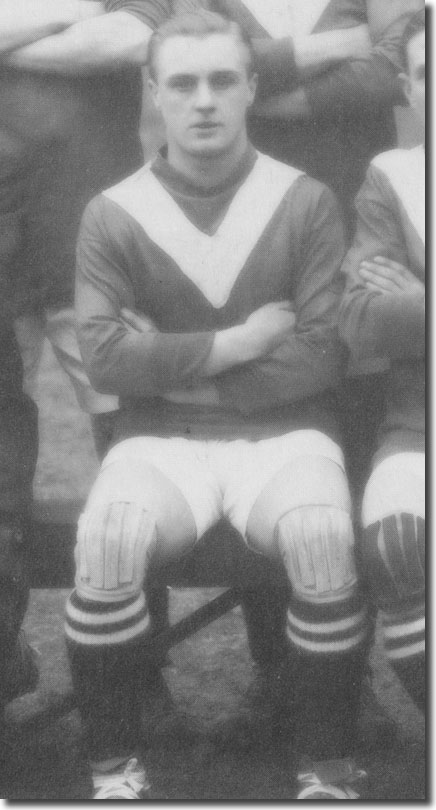 the
Leeds defence proved capable of surmounting a difficult task.'
the
Leeds defence proved capable of surmounting a difficult task.'
The Bramall Lane return was lost by a single goal and was notable
only for the return of Billy McLeod to the Leeds side.
City still had their rearranged game at Coventry to play to complete
their Midland section commitments, but now set off on their Subsidiary
Tournament fixtures.
They began well enough, beating Huddersfield 3-0 at Elland Road
on 22 March, but then lost 1-0 in the return game and 5-0 away
to Bradford Park Avenue. Clem Stephenson's brother
Jimmy and Simpson Bainbridge were back on the wings after
lengthy absences, but achieved little. City gained revenge for
the defeat by beating Bradford 3-1 at Elland Road on 12 April.
Referee John Lewis was in the crowd and informed the Evening Post
that 'a strange thing happened in the game. The Leeds custodian (Willis
Walker) turned out in what looked like a black jersey, and was allowed
to play in it. That is quite contrary to the Football League rules, which
provides that goalkeepers must wear jerseys of distinctive colour and
gives four colours, one of which must be worn. Black or grey are the least
pronounced of colours, and are not allowed to be worn. The reason the
rule was altered in favour of easily recognisable colours was that the
referee and everybody else should be able clearly to distinguish the custodian
from the other players. At half time the Leeds keeper changed his jersey.
I cannot understand why clubs provide jerseys that infringe the rule,
or allow their goalkeepers to appear in them.'
Bainbridge was on the score sheet a week later, but could not
prevent the Peacocks losing 2-1 at Bradford City.
On Tuesday, 22 April, Leeds completed their Midland Section fixtures
with a 3-1 victory at Coventry to confirm a fourth place finish,
four points behind champions Nottingham Forest.
The following day City's directors announced the appointment
of Bob Hewison as manager in succession to Herbert Chapman.
back to top
Old Ebor in the Evening Post: 'I am sure all followers of the
Leeds City club will congratulate the directors on having engaged the
services of Bob Hewison as manager, and will wish Mr Hewison himself the
fullest success in his new capacity. I have always thought that the success
of the Leeds City team in the war period was due very largely not only
to Hewison's sterling play, but also to the quiet force of his example.
He was essentially a large hearted player, cool when things were going
wrong, and good tempered and cheery in all circumstances. Not long ago
I expressed the opinion that the accidents which ended Hewison's active
career led directly to the falling off in the team's play, which an unbiased
observer must have noted during the season now concluding. Popular among
the players, yet with a reserve of character to command respect and ensure
discipline, Bob Hewison ought to make a successful manager. He will not
be without encouragement and service from his predecessor, Mr Herbert
Chapman.'
Hewison saw his team end the Subsidiary competition impressively
by defeating Bradford City 3-0 at Elland Road thanks to a brace
from McLeod and one from Bainbridge.
The same day the directors revealed their plan 'to convert the club into
a limited liability company. The club, with all its players and assets,
will be handed over, and therein the public will have the nucleus of a
successful club and suitable ground.'
From the moment they assumed control in 1915, the Joseph Connor syndicate
made no secret of their readiness to hand the reins over to supporters
when circumstances permitted. They now reported that the way they had
run affairs during the war 'has turned out more successful than at one
time seemed likely, and the guarantors in offering the club to the public
once more are able to submit a concern which is paying its way. The assets
of the club are not inconsiderable. They comprise the goodwill which is
attached to a club in membership of the English League and the capital
value to the club of about a score of players.'
The Evening Post noted: 'Before a new season is commenced it is
regarded as inevitable that something like £1,000 will have to be spent
in putting the stands and appointments of the ground in a state of repair.
The total amount already spent on the ground amounts to about £7,000 and
if the Leeds City club do not purchase the ground before the expiration
of the lease in 1926, the whole of the property - stands and offices included
- will be taken over by Bentley Breweries Ltd, who are the present owners
of the land. The club, however, has an option to purchase the freehold
before August 1921 and it will be the business of all well-wishers of
the club to bring about that consideration as early as possible.
'Mr J Connor, chairman of the directors, has no doubt as to the future
of the club, provided the City football enthusiasts will provide the financial
backing which is necessary at the outset. The club must, however, as he
points out, make a fresh start, by which he means that the original shareholders
of the club must be prepared to forego their holdings, which were practically
wiped out when the liquidator disposed of the property four years ago.
'The position of the debenture holders is that they simply hold the ground
under an old agreement, and let it to the club at a yearly rental of £250.
The lease of the ground does not expire until 1926, but the option to
purchase expires in August 1921.
'He anticipated that under the new conditions of increased wages, it
will cost something like £9,000 or £10,000 a year to run a Second Division
club like Leeds City.'
A month later, City added to the positive mood by winning the
West Riding Senior Cup for the second time in the club's history.
They needed two attempts to do so, playing out a goalless draw
against Huddersfield Town at Valley Parade on 17 May. The replay
was held at the same venue a week later. In the first five minutes
a clash of heads between Billy Hampson and Terriers centre-forward
Jack Cock saw both men having to go off; Hampson was back within
a few minutes but Cock could not resume until late in the half.
By then, City were 2-0 up, Clem Stephenson having scored twice
in the space of two minutes. City played a goalless second half
to secure the silverware.
In the spring of 1919, there was an upbeat atmosphere about Elland
Road, but the optimism would soon evaporate as Leeds City Football
Club was engulfed by an infamous
scandal.
back to top
Part 1 1915/16 - Part
2 1916/17 - Part 3 1917/18 - Results and tables












 Part
1 1915/16 - Part 2 1916/17 - Part
3 1917/18 - Results and tables
Part
1 1915/16 - Part 2 1916/17 - Part
3 1917/18 - Results and tables pressed
strongly after the break. They pulled one back, but City held
out for the points.
pressed
strongly after the break. They pulled one back, but City held
out for the points. in
the second half caused some uneasiness among the Elland Road supporters.'
in
the second half caused some uneasiness among the Elland Road supporters.' match
to see the outbreaks of feeling between players before the game had been
more than a couple of minutes in progress. I was told that the previous
Saturday's match at Sheffield had been quite friendly, yet here we had
fists up directly, and after some ten minutes' play, Glennon and Sherwin
had vigorous fisticuff exchanges which resulted in both being sent off
the field. As an eyewitness of the incident, I must state that Sherwin
was not the aggressor, but there was no doubt as to the effectiveness
of his retaliation, and the referee was justified in ordering his dismissal,
even though he had first to ask the linesman for his version of the affair.
Possibly the feeling that Sherwin had been hardly dealt with accounted
for the feeling also shown by the crowd. There was, however, some difficulty
in understanding certain of the referee's rulings in the match; and if
it is retorted that this showed the ignorance of the crowd, then I must
admit that I shared their ignorance.'
match
to see the outbreaks of feeling between players before the game had been
more than a couple of minutes in progress. I was told that the previous
Saturday's match at Sheffield had been quite friendly, yet here we had
fists up directly, and after some ten minutes' play, Glennon and Sherwin
had vigorous fisticuff exchanges which resulted in both being sent off
the field. As an eyewitness of the incident, I must state that Sherwin
was not the aggressor, but there was no doubt as to the effectiveness
of his retaliation, and the referee was justified in ordering his dismissal,
even though he had first to ask the linesman for his version of the affair.
Possibly the feeling that Sherwin had been hardly dealt with accounted
for the feeling also shown by the crowd. There was, however, some difficulty
in understanding certain of the referee's rulings in the match; and if
it is retorted that this showed the ignorance of the crowd, then I must
admit that I shared their ignorance.' Barnsley
rout.'
Barnsley
rout.' were
probably able to pay more than the League clubs, and perhaps arrangements
might be made under which they could do so. Mr John Lewis, who spoke of
the impossibility of some clubs paying more than at present, stated that
players who had been working on munitions had been making £8 or £9 a week.
The Management Committee knew this to be the case from the insurance documents,
which had been furnished to them when players were injured.
were
probably able to pay more than the League clubs, and perhaps arrangements
might be made under which they could do so. Mr John Lewis, who spoke of
the impossibility of some clubs paying more than at present, stated that
players who had been working on munitions had been making £8 or £9 a week.
The Management Committee knew this to be the case from the insurance documents,
which had been furnished to them when players were injured. second half, counter-balanced in the space of three minutes the products
of the City's earnest endeavours of the previous fifty minutes. It was
then the City attack proved they were no mere showmen. They revealed a
reserve of stamina and dash which carried the opposition and the crowd.
It is true it was a penalty which gave them a level start in the last
lap, but it was the manner in which they pursued and obtained the deciding
points which made them worthy victors.
second half, counter-balanced in the space of three minutes the products
of the City's earnest endeavours of the previous fifty minutes. It was
then the City attack proved they were no mere showmen. They revealed a
reserve of stamina and dash which carried the opposition and the crowd.
It is true it was a penalty which gave them a level start in the last
lap, but it was the manner in which they pursued and obtained the deciding
points which made them worthy victors. match with Nottingham Forest at Elland Road, a brilliant victory on the
Forest ground being followed by a severe defeat on their own enclosure.
match with Nottingham Forest at Elland Road, a brilliant victory on the
Forest ground being followed by a severe defeat on their own enclosure. the
Leeds defence proved capable of surmounting a difficult task.'
the
Leeds defence proved capable of surmounting a difficult task.'